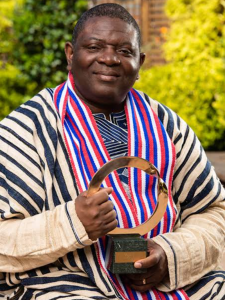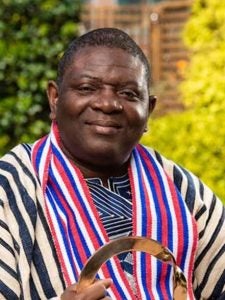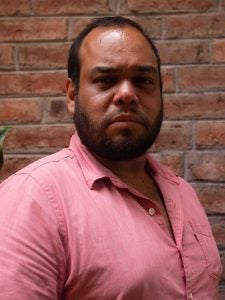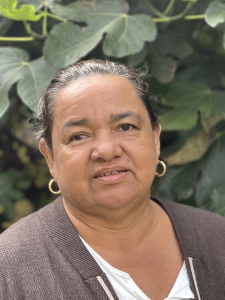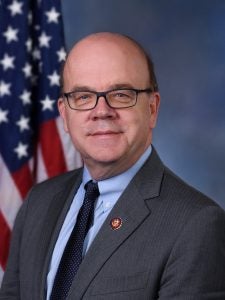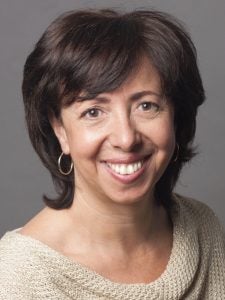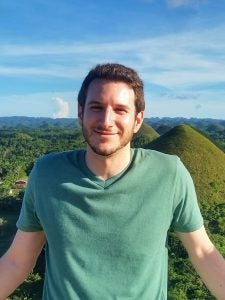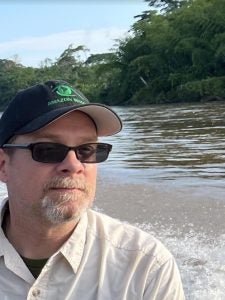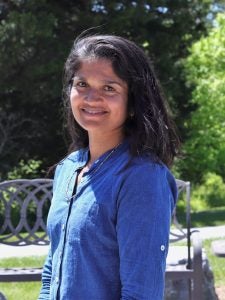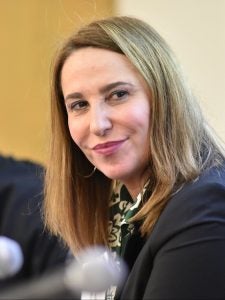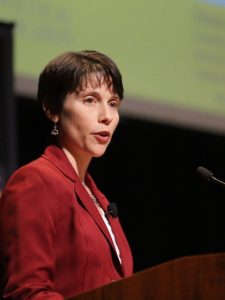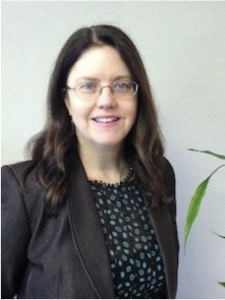Protecting Environmental Defenders in an Age of Climate Emergency
Every day, environmental activists around the world put their lives and safety on the line to protect and promote our universal human right to a clean, healthy, and sustainable environment. It is vital and—sadly—dangerous work. In working to guarantee our collective future against the existential threat of climate change and environmental degradation, these defenders and their family members face grave risks, including harassment, cybersurveillance, lawsuits, stripping of their professional licenses, violence, criminalization, enforced disappearances, and even murder. On April 9, 2024 the Human Rights Institute’s annual Samuel Dash Conference on Human Rights focused on environmental rights defenders and what we can do to ensure that they are free to carry out their important work in safety and dignity.
Featuring a keynote speech from 2019 Goldman Environmental Prize winner Alfred Brownell, the conference gathered activists and lawyers from around the world to discuss current and emerging threats against defenders, ending corporate attacks, and how to advance laws and policies to protect defenders.
Keynote by 2019 Goldman Environmental Prize Winner Alfred Brownell
The Human Rights Institute welcomed 2019 Goldman Environmental Prize Winner Alfred Brownell as this year’s keynote speaker. As an environmental human rights advocate and lawyer standing up for the rights of indigenous communities, Mr. Brownell faced life-threatening violence that forced him to flee his home country of Liberia. “As a lawyer on the frontlines,” he acknowledged, his experience is not limited to him or the people in his region. To protect defenders who have been silenced around the world, he championed the law as a critical tool to create international protections.
Mr. Brownell underscored the need for transparency and reporting and recalled that the silencing of environmental defenders is easy to cast aside as a distant issue. Furthermore, he urged that while “it is easy to talk about others,” it is crucial that countries pursue domestic measures to lay the groundwork for a coordinated international approach. This may include developing protective policies, openly publishing data about defenders’ experiences, and actively investigating violations.
He also spoke about the fragmented nature of existing initiatives meant to protect environmental defenders and emphasized that it is essential for defenders to be “in the driver’s seat.” Given the varied political tools used to silence advocates, Mr. Brownell acknowledged defenders’ unique experiences as key to deconstructing oppressive structures.
In closing, Mr. Brownell recognized other defenders’ persistent advocacy in the face of threats and highlighted the power of community-informed laws to empower defenders to speak up.
Watch Alfred Brownell’s keynote address:
Keynote Speaker
Panel 1 — Threats to Environmental Human Rights Defenders
The first panel discussed the reality of the human rights situation on the ground and the struggles faced by environmental defenders in their pursuit of a clean, healthy, and sustainable environment for all. According to Global Witness, at least 177 environmental defenders were killed in 2022 – a number that constitutes nearly fifty percent of the recorded deaths of all human rights defenders around the world. Over half of all reported killings in 2019 occurred in just a few countries: the Philippines and Colombia. And the number of killings and other forms of attacks continues to rise. Especially for environmental defenders who are women, youth, and people from indigenous and rural communities, they oftentimes face the greatest threat from the effects of climate change and stand to suffer the gravest retaliation against their work.
HRI Deputy Director Michelle Liu, who moderated the panel, asked Jani Silva, a Colombian community leader and environmental defender, why threats, attacks, and killings against environmental defenders were so pervasive in Colombia. Jani spoke of the “threat” that environmental defenders posed to various extractive industries, including oil, gas, and mining, as well as the propensity for legal and illegal armed actors, such as the military or drug cartels, to be complicit in the violence.
Veronica “Derek” Cabe, a coordinator and community organizer for the Coal and Nuclear-Free Bataan Movement, spoke about the interconnectedness of air pollution and climate change, as well as the threats to environmental defenders in the Philippines. She explained that severe weather phenomena, like typhoons, are becoming more frequent and more devastating; and, at the same time, coal-fire plants contribute to air pollution and climate change that impose serious health consequences for individuals and communities. Ms. Cabe also highlighted the murder of a close friend, environmental activist Gloria Capitan, who was killed for her efforts to stop a coal-fire plant that caused health problems for her grandchildren.
Eduardo Mosqueda, a Mexican human rights and environmental lawyer, spoke about his work and the challenges he faced in defending the land rights of the Nahua people against an iron mining company. Mr. Mosqueda, who himself was detained and imprisoned for his advocacy work, echoed Jani’s concerns about companies working together with organized crime actors to silence environmental defenders, and he highlighted government corruption as another driver for enforced disappearance and kidnappings. “When we lose a defender,” he said, “we lose the opportunity for a better world.”
Finally, Alfred Brownell, a Liberian environmental rights activist and lawyer, stressed the urgent need to protect and support defenders. “This is how we ensure a livable, sustainable climate for all of us.” He explained that while available data shows that countries like Colombia, Mexico, Brazil, and the Philippines are the most dangerous for environmental defenders, the number of threats, attacks, and reprisals are under-reported and under-documented in many other countries, such as Liberia and other African states. In underscoring the need for young advocates to go out, investigate, and help protect defenders, Mr. Brownell stated that the attacks are increasing because “we are winning.”
Watch Panel 1 on Threats to Environmental Human Rights Defenders:
Panelists
A Conversation with U.S. Representative Jim McGovern
U.S. Representative Jim McGovern has championed human rights throughout his career. He began his public service as an intern in the U.S. Senate and the U.S. House of Representatives, where he was immersed in human rights issues relating to hunger, accountability for atrocities, and government transparency. These experiences, he said, humanized issues that are often distilled to numbers, and he emphasized that “telling stories is just as important as statistics” in bringing about change. Now, as Co-Chair of the Tom Lantos Commission on Human Rights and co-sponsor of the 2024 Human Rights Defenders Protection Act, Rep. McGovern advocates for a defender-centered approach to protecting human rights and he has made on-the-ground experiences the crux of the Commission’s work to foster connections across party lines. Rep. McGovern said that he travels frequently to learn about defenders’ experiences directly, explaining that defenders “tell you the truth—what the reality is, not what the spin is.”
In speaking to HRI Executive Director Elisa Massimino about the key provisions of the Human Rights Defenders Protection Act, Rep. McGovern said that the bill aims to establish a comprehensive and consistent strategy from the U.S. government to support and protect human rights defenders abroad, including through providing trainings in each U.S. Embassy for State Department staff, supporting accountability for attacks against defenders, and increasing engagement with host governments to strengthen their response, among other measures.
Watch the conversation with Rep. Jim McGovern:
Film Screening — Hold the Line (2023)
“A film about human rights defenders, polluters, and the climate crisis. As industries rake in record profits, the world we share is being destroyed. Human rights defenders are pushing back on polluters, but their struggle comes at a great price. Filmed across three countries, Hold the Line brings their common story to life on screen.”

Panel 2 — Ending Corporate Attacks on Environmental Defenders
Environmental defenders’ work often places them in direct confrontation with powerful corporate actors. By challenging the harmful impacts of fossil fuels, mining, agribusiness, logging, and other industries, environmental defenders may face threats to their lives and physical safety. Too often, actions by corporations that place environmental defenders at risk may be compounded by illegal armed groups, state actors, or international financial institutions, making the work all the more dangerous for those who speak out.
Environmental defenders also face corporate threats of financial ruin and reputational damage as tactics to silence them. Globally, environmental defenders have suffered a dramatic increase in the corporate use of strategic lawsuits against public participation (SLAPPs), meritless civil or criminal lawsuits designed to intimidate and financially overwhelm defenders. According to EarthRights International, in the U.S. over the last decade the fossil fuel industry used at least 150 instances of SLAPP lawsuits and other abuses of the legal system to harass environmental defenders. Such lawsuits, while baseless, often have the desired effect of silencing defenders, while shrinking overall civic space to challenge bad corporate actors.
This panel spotlighted the risks environmental defenders face in opposing powerful corporate interests, and how activists—from the U.S. to the Philippines—are fighting back. From the growth of anti-SLAPP legislation to the role of international financial institutions, this discussion featured experts at the forefront of ensuring the long-term resilience and vibrancy of environmental defenders.
HRI’s Dash-Muse Senior Teaching Fellow Catherine Cooper, who moderated the panel, asked Andrew Miller, Advocacy Director at Amazon Watch, about the relationship between companies and illegal armed groups who threaten and murder environmental defenders and who also claim that they are simply helping to ensure that extractive activities go on unimpeded. Collaborations between companies, armed groups, the military, and the government can lead to impunity for violence against those who speak out about environmental harm, explained Mr. Miller. Effective protection of environmental defenders will require sustained efforts over time, including international publicity, going after companies’ private sources of funding, and forcing governments to investigate violations and end impunity.
Deepa Padmanabha, Deputy General Counsel for Greenpeace USA, explained that Greenpeace has been targeted with two SLAPP lawsuits designed to stop Greenpeace’s advocacy, bankrupt them, and eventually shut them down, as well as to scare others into silence. The case filed by Energy Transfer over Greenpeace’s involvement in the Standing Rock protests, for example, would have set a dangerous precedent that anyone involved in protests, including training protesters, could be held responsible for all acts committed during the protest had it not been dismissed by a federal court in 2019. Ms. Padmanabha pointed out, however, that “SLAPP lawsuits are driven by fear; we are winning, our movements are growing stronger, and these corporations are feeling the force of people power. The most important thing we can do at this moment is to make our movement stronger, louder, and more effective than ever.”
Benjamin Hoffman, Senior Supervising Attorney at EarthRights International, highlighted the landmark case of Doe v. IFC as the first time that any international financial institution was held to account for the harm it caused to communities. Alleging that IFC was liable for financing Corporación Dinant’s violent land-grabbing campaign in Honduras and that it knew or should have known that its money was abetting murder and other serious abuses, EarthRights International successfully forced IFC to agree to a settlement.
Veronica “Derek” Cabe, who spoke about threats to environmental defenders in the Philippines on Panel 1, added that SLAPP lawsuits are forcing farmers and fishermen in the Philippines into debt or jail. Ms. Cabe also spoke about Filipino government actors who engage in the practice of “red-tagging” environmental defenders, labeling them as “communists” or “terrorists” in order to prevent popular support for their activism.
Watch Panel 2 on Ending Corporate Attacks on Environmental Defenders:
Panelists
Panel 3 — Protecting Environmental Defenders Through Law and Policy
The movement to recognize and expand protections for environmental rights has gained significant momentum in recent years. In a landmark resolution in 2022, the United Nations General Assembly recognized the right to a clean, healthy, and sustainable environment as a human right. The following year, the United Nation Human Rights Council called for the creation of legal frameworks to uphold and implement the right.
There have been successes in introducing protective measures for defenders, such as the Escazú Agreement and the creation of the Special Rapporteur on Environmental Defenders under the Aarhus Convention. However, gaps and challenges remain, and environmental defenders must continue fighting for effective domestic protections.
How do recent legal and policy developments help to protect the protectors of our planet, and what can law and policy-makers do to make international guarantees a reality on the ground? What can states do to better guarantee the protections established in international and regional agreements at the national level? This panel examined the ongoing efforts to use creative legal and policy tools to protect environmental human rights defenders.
Georgetown’s Environmental Law and Justice Clinic’s Supervising Attorney and Teaching Fellow Sarah Dorman, who moderated the discussion, opened the panel with a reminder that “attempts to silence defenders are indicative of the power they have.” She pointed to the broadening legal recognition of environmental rights as both an indication of defenders’ success and projection of the power of law.
Georgetown’s 2023-2024 Robert F. Drinan, S.J., Chair in Human Rights, Soledad García Muñoz, emphasized that international legal structures, including the Inter-American Commission on Human Rights, are essential to protecting the right to a healthy environment. She underscored the unique ability of the IACHR, and other legal systems, to define standards in the novel international environmental law landscape. Given the interconnectedness of environmental rights with other human rights, she explained that the legal landscape’s development can pave the way for the strengthening of other protections. In an era when “development and business seem to be at odds with human rights,” legal structures’ interdependent impacts can also help respond to pressing challenges.
Despite efforts to enforce environmental law and policy, Danya Greenfield, Senior Program Manager for the Lifeline Fund for Embattled CSOs at Freedom House, highlighted concerns about the “gaps between law and practice, and between practice and implementation.” To bridge this gap, she explained, civil society can help implement regulations in partnership with community organizations or NGOs. For example, grants that fund legal services or psychological counseling for environmental defenders could be a crucial source of support. Furthermore, civilians’ expertise can inform the development of training programs that provide defenders with the tools to navigate threats.
Integrating civil society into the implementation of laws can guide more community-based initiatives, which Andrew Miller described as the crux of effective, sustainable protections. He advocated for initiatives that “begin with the experiences of defenders themselves” to enhance their legitimacy. Although high-level government policies are well-intentioned, he acknowledged that they often do not account for on-the-ground nuances, like cultural and spiritual practices, which can hinder effective implementation.
Finally, Deborah Klepp, the Senior Advisor for Environment in the Front Office of the State Department’s Bureau of Oceans and International Environmental and Scientific Affairs, highlighted that foreign ministries and the U.S. Department of State have already released resources for defenders seeking support. Ensuring that defenders are aware of the resources available to them is a critical next step, she noted. Ms. Klepp reminded the audience that advocacy is “not something environmental defenders woke up one day and decided they were going to do; they were thrust into this work.” Ms. Klepp envisioned legal and policy tools as the key to cultivating a landscape where defenders do not have to serve as defenders in the first place.

